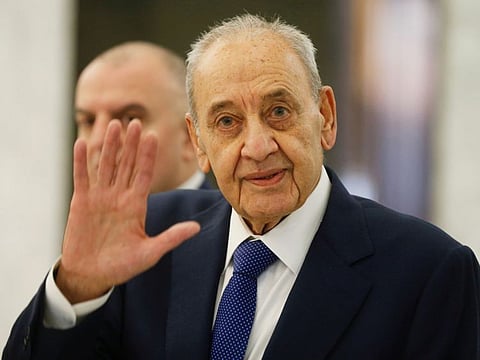Cracks appear in Lebanon’s Hezbollah-led March 8 coalition
‘Battle for the post of speaker of parliament is already underway’

Damascus: Lebanese Parliament Speaker Nabih Berri and ex-director of general security Jamil Al Sayyed are technically part of the same team, both affiliated with the Hezbollah-led March 8 Coalition. In reality, however, the two Shiite politicians are miles apart, due to the simmering rivalries between them. Prime on the list is a firm belief among Berri’s supporters that Al Sayyed wants to succeed him as speaker of parliament — a post that Berri has held since 1992.
“The battle for the post of speaker of parliament is already underway,” said political analyst Fadi Akoum, “although the new elections are not due before two years from now.”
Twitter war
On the night of January 24-25, 60 men showed up at Al Sayyed’s home in Janah, a residential neighbourhood of Beirut, accusing the current MP and former army general of insulting them through one of his posts on Twitter, an accusation that Al Sayyed denies and says was fabricated by Berri’s security adviser Ahmad Baalbaki.
On Twitter, Al Sayyed snapped: “Nobody should test my pride and send me messages through the street.” He then openly addressed Berri, asking him to clamp down on Ahmad Baalbaki, and threatening: “Put him away … for his own sake!”
The threat raised much anger in Berri circles, who accuse Al Sayyed of insulting their boss. Hezbollah, a firm ally of both Nabih Berri and Al Sayyed, has been surprisingly silent over the latest spat, standing at arms-length from both men.
Berri and Al Sayyed first worked together in the 1980s, when the former held the ministry of justice and Al Sayyed was director of intelligence in South Lebanon. In 1998, Al Sayyed was promoted to the job of director of general security, during the era of Syria’s strongman in Lebanon, President Emille Lahhoud.
Al Sayyed became a powerbroker in Lebanese politics, challenging Berri’s long-established grip over the Shiite community. He was discharged and arrested in 2005, accused of the murder of former Prime Minister Rafik Hariri. Upon his release in 2009, he launched his political career within the Hezbollah-led March 8 Coalition, challenging Berri, who was supposed to be a tactical ally.
“Politicians in Lebanon have traditionally named their successors, whether in their own political parties or government posts,” said Akoum. “Berri has not named a successor, which explains Sayyed’s ambition to succeed him as speaker. He has positioned himself within the Resistance Bloc, which means full support from Hezbollah. The problem is how he will deal with the Future Movement, where many still accuse him of either taking part in or knowing about the conspiracy to assassinate Hariri.”
If he nominates himself for the post at the end of the current parliament, he would win the votes of the Free Patriotic Movement, which have an axe to grind with the current speaker. They currently hold 29 out of 128 seats in Parliament. It is unclear how Hezbollah would react to his nomination, with their 13 seats in the Chamber.
Can Al Sayyed mend relations with the Future Movement, however, which controls another 20 seats in Parliament? “In politics, anything can happen,” Akoum said to Gulf News. “It’s all about deals and mutual interest. We need to see what Al Sayyed can offer the Future Movement, if not to support his candidacy than at least, so that they don’t object to it.”
Cracks in March 8
This is not the first crack that has emerged in the March 8 Coalition. In 2016, Maronite leader Suleiman Frangieh, who heads the Marada Movement, briefly withdrew his support after Hezbollah nominated Michel Aoun for the presidency, a post that he had coveted and which he claimed had been promised to him by both Hezbollah and Damascus.
In 2018, Berri clashed with foreign minister Gebran Bassil, the son-in-law of President Aoun, who accused him of being “a thug”. That crisis was sparked when Aoun and Bassil signed off a salary increase for army generals, without going through the Ministry of Finance, held by a Berri protégé. That led to a street clash between Berri supporters and those of the Free Patriotic Movement (FPM), which was headed by Bassil.
That year, they all set aside their differences, campaigning on joint lists for parliament, although Al Sayyed openly said that the Bekaa Valley, from which he hails, deserves its turn at the speakership of parliament.



